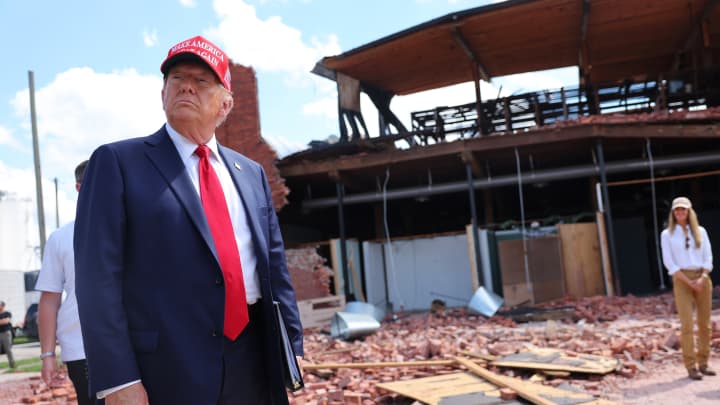
Donald Trump's on Wednesday sparked a palpable sense of dismay among the climate community, with two key architects of the warning that the result will stall global efforts to protect the environment.
Trump will defeat his Democratic rival Kamala Harris and return to the White House for a second four-year term, according to an NBC News projection.
It marks a historic and somewhat improbable comeback for one of the most polarizing figures in modern American politics.
The 78-year-old, who has called the climate crisis " ," has pledged to fossil fuel production, outgoing President Joe Biden's emissions-limiting regulations and pull the country out of the Paris climate accord — .
The 2015 Paris Agreement is a critically important framework designed to reduce greenhouse gas emissions. It aims to "limit global warming to well below 2, preferably to 1.5 degrees Celsius, compared to pre-industrial levels" over the long term.
Laurence Tubiana, a key architect of the Paris Agreement, said Trump's election victory "is a setback for global climate action, but the Paris Agreement has proven resilient and is stronger than any single country's policies."
Tubiana, a French economist and diplomat who now serves as CEO of the European Climate Foundation, said the context today is "very different" to Trump's first election victory in 2016.
"There is powerful economic momentum behind the global transition, which the US has led and gained from, but now risks forfeiting. The devastating toll of recent hurricanes was a grim reminder that all Americans are affected by worsening climate change," Tubiana said.
"Responding to the demands of their citizens, cities and states across the US are taking bold action," she added.
"Europe now has the responsibility and opportunity to step up and lead. By pushing forward with a fair and balanced transition, in close partnership with others, it can show that ambitious climate action protects people, strengthens economies, and builds resilience."
Separately, Christiana Figueres, the former United Nations climate chief who oversaw the 2015 Paris summit, said the U.S. election result will be regarded as a "major blow to global climate action."
However, Figueres said "it cannot and will not halt the changes underway to decarbonise the economy and meet the goals of the Paris Agreement."
"Standing with oil and gas is the same as falling behind in a fast moving world," she continued, predicting that clean energy technologies would continue to outcompete fossil fuels over the coming years.
"Meanwhile, the vital work happening in communities everywhere to regenerate our planet and societies will continue, imbued with a new, even more determined spirit today," Figueres said.
"Being here in South Africa for the Earthshot Prize makes clear that there is an antidote to doom and despair. It's action on the ground, and it's happening in all corners of the Earth."




